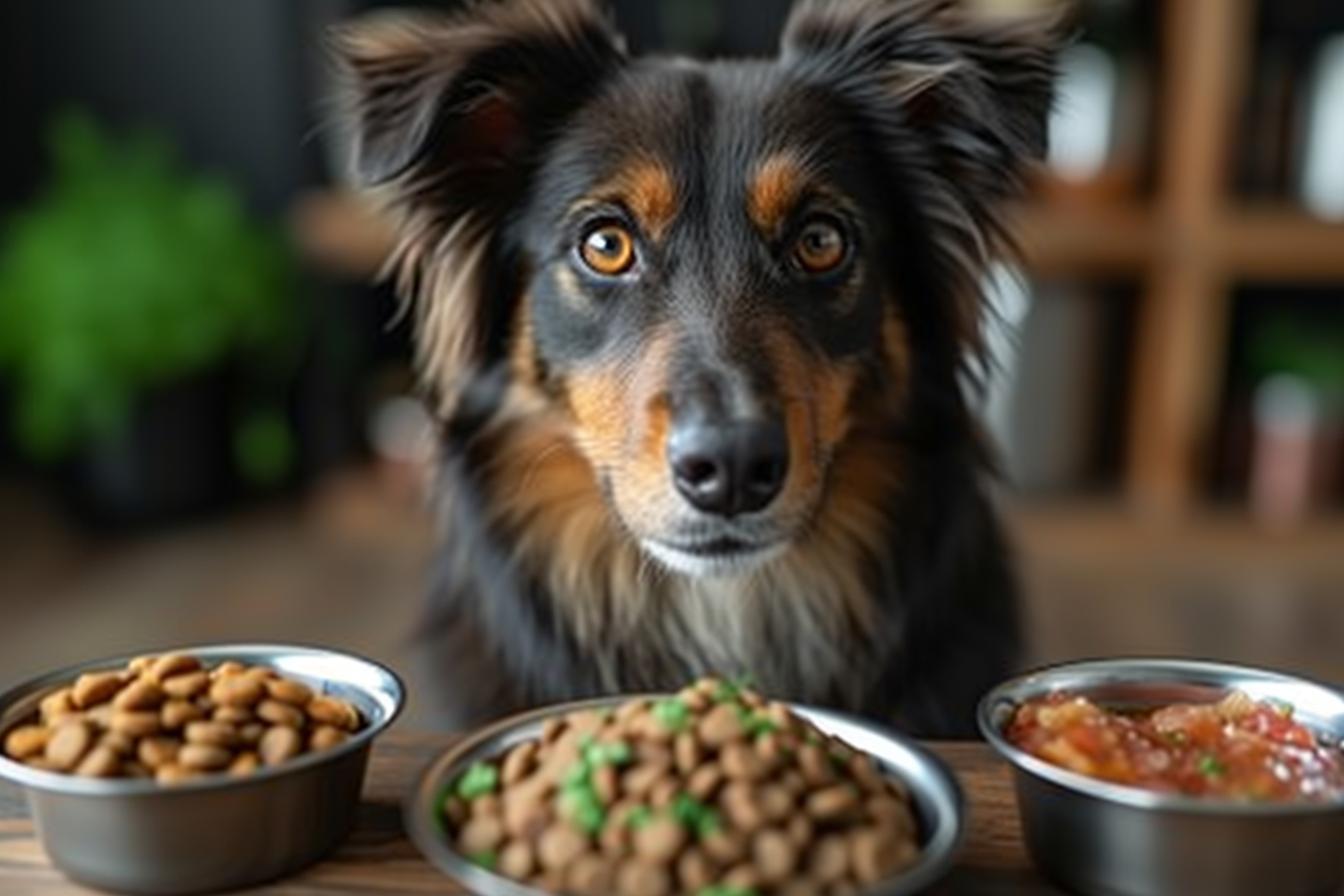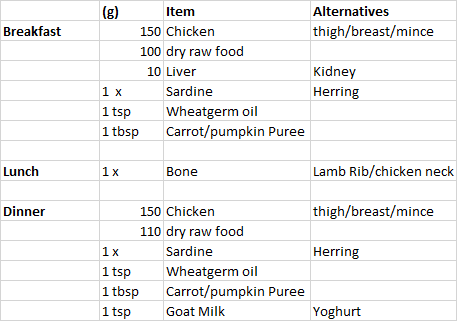A Border Collie puppy needs a balanced diet for healthy growth. Their food should include proteins, fats, vitamins, and minerals.
Border Collie puppies are active and energetic, requiring a diet that supports their high energy levels and rapid growth. Proper nutrition in the early stages is crucial for their development, impacting their health and behavior. Understanding the specific dietary needs of your Border Collie puppy ensures they get the right nutrients to thrive.
This includes quality proteins for muscle development, fats for energy, and essential vitamins and minerals for overall health. Feeding them the right food helps in building a strong foundation for their future well-being. In this guide, we will explore the best food choices and tips for feeding your Border Collie puppy, ensuring they grow into healthy, happy dogs.

Credit: www.feedingmydogbreed.com
Nutritional Needs
Understanding the nutritional needs of your Border Collie puppy is crucial. A balanced diet ensures they grow healthy and strong. Puppies have different needs than adult dogs. Providing the right nutrients can lead to a happy and active pup.
Essential Nutrients
Border Collie puppies need a mix of essential nutrients. These nutrients support their growth and energy levels. Here are the key components:
- Proteins: Essential for muscle development and repair.
- Fats: Provide energy and support brain development.
- Carbohydrates: Offer a quick source of energy.
- Vitamins: Support immune function and overall health.
- Minerals: Important for bone development and metabolic functions.
- Water: Vital for hydration and bodily functions.
Age-appropriate Diet
The diet of a Border Collie puppy should change as they age. Tailoring their diet to their age ensures they get the right nutrients at the right time.
| Age (Months) | Diet | Feeding Frequency |
|---|---|---|
| 0-2 | Mother’s milk | On demand |
| 2-4 | Puppy food with high protein | 4-5 times daily |
| 4-12 | Puppy food with balanced nutrients | 3-4 times daily |
For puppies aged 0-2 months, mother’s milk is best. It provides all the nutrients they need. At 2-4 months, introduce high-protein puppy food. This supports rapid growth. Feed them 4-5 times a day. From 4-12 months, continue with balanced puppy food. Reduce feeding to 3-4 times a day.

Credit: www.lovelybordercollie.com
Choosing The Right Food
Choosing the right food for your Border Collie puppy is crucial. The right diet supports their growth, energy levels, and overall health. Let’s explore the options and what to look for in puppy food.
Commercial Vs. Homemade
There are two main options for feeding your Border Collie puppy: commercial dog food and homemade meals. Each has its benefits and drawbacks.
| Commercial Food | Homemade Food |
|---|---|
|
|
Commercial food is easy and ensures balanced nutrition. Homemade food allows you to control ingredients but requires more effort and knowledge.
Reading Labels
Reading the labels on dog food packages is essential. It ensures your puppy gets the right nutrients. Here are some key points to consider:
- Ingredients List: Look for real meat as the first ingredient. Avoid fillers like corn and soy.
- Nutritional Adequacy: The food should meet AAFCO standards. This ensures balanced nutrition.
- Guaranteed Analysis: Check for protein, fat, fiber, and moisture content. Ensure it matches your puppy’s needs.
Understanding these labels will help you make an informed choice. Ensure the food supports your puppy’s growth and health.
Feeding Schedule
A proper feeding schedule is vital for a Border Collie puppy. It ensures they get the right nutrients. This helps them grow strong and healthy. Let’s explore the ideal feeding routine for your furry friend.
Meal Frequency
Border Collie puppies need several meals a day. At 8-12 weeks, feed them four times daily. This supports their rapid growth and high energy. From 3-6 months, reduce meals to three times a day. After six months, you can move to two meals daily.
Portion Sizes
Portion sizes depend on your puppy’s age and weight. Follow the guidelines on the food packaging. Puppies need more food than adult dogs. They burn a lot of energy. Avoid overfeeding to prevent obesity. Adjust portions as your puppy grows. Keep track of their weight and health.
Introducing New Foods
Introducing new foods to a Border Collie puppy should be a careful process. Their digestive systems are sensitive. Too many changes at once can cause issues. Puppies need a balanced diet to grow healthy. Start with high-quality puppy food. Then, slowly introduce new foods.
Gradual Transition
When introducing new foods, a gradual transition is key. Sudden changes can upset your puppy’s stomach. Follow these steps:
- Mix a small amount of the new food with the old food.
- Over 7-10 days, gradually increase the new food while decreasing the old food.
- Observe your puppy’s reaction during this period.
This slow process helps your puppy adapt. Their digestive system will thank you.
Monitoring Reactions
During the transition, monitor your puppy’s reactions. Look for signs of digestive issues:
- Vomiting
- Diarrhea
- Excessive gas
- Loss of appetite
If you notice any of these signs, slow down the transition. Sometimes, you may need to pause and consult a vet. Different puppies react differently. A food that works for one may not work for another.
Keep an eye on your puppy’s energy levels. Also, watch their coat and skin condition. Healthy puppies are active and have shiny coats. Any changes in these areas can signal a problem.
Introducing new foods is a gradual and careful process. Your Border Collie puppy’s health and happiness depend on it.
Treats And Snacks
Treats and snacks play an essential role in a Border Collie puppy’s diet. They can be used for training, rewarding good behavior, or just showing love. But it’s crucial to choose healthy options and avoid overfeeding.
Healthy Options
Choose treats that are natural and free from additives. Fruits like apples and blueberries make great snacks. Vegetables such as carrots and green beans are also good choices. These options are low in calories and high in nutrients.
Look for dog treats made from high-quality ingredients. Avoid those with artificial flavors, colors, or preservatives. Protein-rich treats, like small pieces of cooked chicken or turkey, are also beneficial. They support muscle growth and overall health.
Avoiding Overfeeding
It’s easy to overfeed a Border Collie puppy with treats. This can lead to weight gain and health issues. Always measure the treats you give and keep track of their daily intake. Treats should make up no more than 10% of their daily calories.
Break larger treats into smaller pieces. This way, your puppy still gets rewarded without consuming too many calories. Also, use treats primarily for training or rewarding good behavior. Avoid giving treats out of boredom or as a substitute for attention.
Special Dietary Considerations
When raising a Border Collie puppy, special dietary considerations are crucial. These energetic pups need the right nutrients to thrive. Focus on their specific needs to ensure they grow healthy and strong.
Food Allergies
Border Collie puppies can develop food allergies. Common allergens include chicken, beef, and grains. Watch for signs like itching, ear infections, or digestive issues. If you suspect an allergy, consult your vet. They might recommend an elimination diet to pinpoint the allergen.
Sensitive Stomachs
Some Border Collie puppies have sensitive stomachs. They may experience diarrhea or vomiting with certain foods. Choose high-quality, easily digestible ingredients. Avoid artificial additives and fillers. Gradually introduce new foods to avoid upsetting their stomach.
Hydration
Ensuring proper hydration is crucial for the health and well-being of your Border Collie puppy. Water is vital for many bodily functions. Without it, your puppy could face serious health issues. Let’s dive into why water is so important and how to recognize signs of dehydration.
Importance Of Water
Water aids in digestion and helps in nutrient absorption. It also regulates body temperature and lubricates joints. A Border Collie puppy, active and energetic, requires more water than an adult dog.
Providing clean, fresh water is essential. Aim to refill your puppy’s water bowl multiple times a day. Keep an eye on their drinking habits. This helps ensure they get enough water.
Signs Of Dehydration
Dehydration can be dangerous for your Border Collie puppy. Watch for these signs:
- Dry gums: Check their mouth. Gums should be moist.
- Lethargy: A dehydrated puppy will be less active.
- Sunken eyes: This is a clear sign of severe dehydration.
- Loss of skin elasticity: Gently pinch the skin. It should return quickly to normal.
If you notice any of these signs, offer water immediately. If the signs persist, contact your vet.
Ensure your puppy always has access to clean, fresh water. This helps maintain their health and happiness.

Credit: www.hypropremium.com.au
Common Feeding Mistakes
Feeding a Border Collie puppy can be challenging. Many new owners make common feeding mistakes that can affect their pup’s growth and health. Let’s explore some of these mistakes and learn how to avoid them.
Overfeeding
Overfeeding is a common mistake. Puppies are small and do not need large meals. Giving them too much food can lead to obesity. It can also cause digestive issues. Use a measuring cup to control portions. Follow the feeding guidelines on the food package. It is better to feed smaller portions multiple times a day. This helps with digestion and keeps energy levels stable.
Inconsistent Feeding Times
Feeding your puppy at inconsistent times can confuse them. Puppies thrive on routine. They need to know when to expect their meals. It helps regulate their digestion. It also makes house training easier. Try to feed your puppy at the same times every day. For example, you can feed them in the morning, at noon, and in the evening. Consistency is key to a healthy and happy puppy.
Frequently Asked Questions
What Should Border Collie Puppies Eat?
Border Collie puppies should eat high-quality puppy food. It should be rich in protein and nutrients. Consult your vet for specific brand recommendations.
How Often Should I Feed A Border Collie Puppy?
Feed a Border Collie puppy three to four times daily. Puppies need frequent meals for proper growth and development.
Can Border Collie Puppies Eat Human Food?
Some human foods are safe, but many are not. Stick to puppy food to ensure balanced nutrition. Consult your vet before introducing any new foods.
How Much Food Does A Border Collie Puppy Need?
The amount varies by age and size. Generally, follow the guidelines on the puppy food packaging. Adjust based on your vet’s advice.
Conclusion
Feeding your Border Collie puppy the right food is crucial. Quality nutrition supports their growth and energy needs. Choose high-quality puppy food rich in protein and essential nutrients. Avoid foods with fillers and artificial additives. Always provide fresh water. Monitor their weight and adjust portions as needed.
Consult your vet for personalized advice. A balanced diet ensures a healthy, happy puppy. Keep these tips in mind for a thriving Border Collie.
